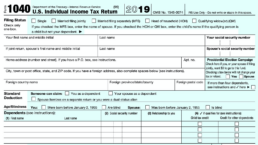Who is an “Accidental American”?
There are on occasion individuals born inside the United States to non-U.S. parents or individuals born outside the United States to U.S. citizen parents, are often unaware of their status as U.S. citizens for years. These individuals are commonly referred to as “Accidental Americans.” While this can initially feel quite exiting for these individuals to discover they are U.S. citizens, the excitement soon fades as they discover they have been U.S. tax residents since birth. U.S. citizens, wherever in the world they reside, are subject to U.S. individual income tax on all sources of income, regardless of where this income is sourced (within or outside the U.S.), as U.S. tax residents. At this point, the value of U.S. citizenship may drop for Accidental Americans, as they must come into compliance with U.S. tax law.
New Option: Relief Procedures
On September 6, 2019, the Internal Revenue Service (IRS) announced procedures to provide a measure of tax relief for certain Accidental Americans. While the Streamlined Foreign Offshore Procedures could be utilized to bring Accidental Americans into compliances with (a) the requirements to file U.S. income tax returns and FBARs, and (b) the Exit Tax Regime, many Accidental Americans had strong motivations to renounce their U.S. citizenship for reasons unrelated to the complex U.S. tax system. The Relief Procedures provide (a) a targeted mechanism for certain low-income and low-net-worth Accidental Americans to come into compliance (i) the requirements to file U.S. income tax returns and FBARs, and (ii) the Exit Tax Regime and (b) relief from all tax, interest, and penalties that otherwise would accrue from the Accidental American’s failure to file U.S. income tax returns, FBARs, and from the Exit Tax Regime.
There are seven principal criteria of the Relief Procedures Accidental Americans must satisfy in order to utilize these Relief Procedure:
- Accidental American Must Have Relinquished U.S. Citizenship Prior to Claiming Relief Under the Relief Procedures, but After March 18, 2010.
- Accidental American Has No Filing History as a U.S. Tax Resident.
- Accidental American Does Not Satisfy the Tax Liability Test Under the Exit Tax Regime.
- Accidental American Does Not Satisfy the New Worth Test Under the Exit Tax Regime.
- Accidental American Has an Aggregate Total Tax Liability of $25,000 or Less for (A) the Five Tax Years Preceding the Accidental American’s Expatriation Date and (B) the Year Including the Accidental American’s Expatriation Date.
- Accidental American Submits All Required Tax Returns for (A) the Five Tax Years Preceding the Accidental Americans Expatriation Date and (B) the Year Including the Accidental American’s Expatriation Date.
- Accidental American’s Past U.S. Tax Compliance Failures Must Be Due to Non-Willful Conduct.
Under the Relief Procedures, the relief is limited to an Accidental American who likely has low income and low net worth, and it requires the Accidental American to have relinquished U.S. citizenship.
Old Option: Streamlined Foreign Offshore Procedures
The best-case U.S. tax relief for an Accidental American was the Streamlined Procedures, issued initially on June 18, 2014. Many Accidental Americans never filed a U.S. income tax return as a tax resident or a Report of Foreign Bank. Financial Accounts (FBAR), a subset of the Streamlined Procedures known as the “Streamlined Foreign Offshore Procedures,” could help Accidental Americans come into compliance with their requirements to file U.S. income tax returns and FBARs.
Accidental Americans who are eligible to use the Streamlined Foreign Offshore Procedures are not subject to failure-to-file and failure-to-pay penalties, accuracy related penalties, information return penalties, or FBAR penalties, all of which can be substantial. The downside of this option is it does not address directly the Exit Tax Regime, in the event Accidental Americans wish to renounce their U.S. citizenship.
To utilize the Streamlined Foreign Offshore Procedures, an Accidental American has to satisfy four conditions:
- The Accidental American’s failure to file timely U.S. income tax returns and FBARs was non-willful.
- For one or more of the most recent three years for which the U.S. income tax due date has lapsed, the Accidental American (a) must not have a U.S. abode and (b) must have been physically outside the U.S. for at least 330 full days.
- The Accidental American files past due FBARs for the immediately prior six years for which the FBAR filing deadlines have lapsed.
- The Accidental American must file U.S. income tax returns for the immediately prior three years for which the U.S. income tax return filing deadline has lapsed, including payments for all tax dues, including interest thereupon.
It is important any Accidental American fully explore their options for coming into compliance with their requirements under the Streamlined Foreign Offshore Procedures before filing a Submission under the Relief Procedures.
Ready to have Berardi on your side?
Whether you’re a business looking to hire or a professional hoping to relocate, immigration law can be complicated. But you don’t have to do it alone. Put our experience to work for you.



